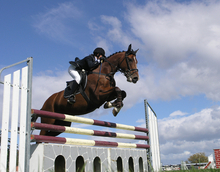The mission of the AAEP is to improve the health and welfare of the horse, to further the professional development of its members and to provide resources and leadership for the benefit of the equine industry. Based on its goals, the AAEP recommends these âClinical Guidelines for the Treatment of Non-Racing Performance Horsesâ to enable its members and the equine industry to provide appropriate care of the horses involved.

Best practices in performance horse care
Based on its goals, the AAEP recommends certain Clinical Guidelines for the Treatment of Non-Racing Performance Horses to enable its members and the equine industry to provide appropriate care of the horses involved.
While veterinary practices may vary depending upon the type of competition, basic tenets concerning diagnosis, treatment and safe and ethical use of medications must be employed.
Treatment of equine athletes must be directed toward normalizing their performance and avoiding performance enhancement by illegal or unethical means.
While veterinarians are required to follow the regulations governing the discipline in which their patients are competing, participation in the establishment of these rules and regulations can be the most effective way to ensure that they are reasonable, uniform and give due consideration to the health and welfare of the horse.regimen.
The veterinarian-client-patient relationship:
The veterinarian-client-patient relationship (VCPR) is the basis for interaction among veterinarians, their clients and their patients.A VCPR exists when all of the following conditions have been met:
- The veterinarian has assumed responsibility for making clinical judgments regarding the health of the horse(s) and the need for medical treatment, and the client has agreed to follow the veterinarianâs instructions.
- The veterinarian has sufficient knowledge of the horse(s) to initiate at least a general or preliminary diagnosis of the medical condition of the horse(s). This means that the veterinarian has recently seen and is personally acquainted with the keeping and care of the horse(s) by virtue of an examination of the horse(s), or by medically appropriate and timely visits to the premises where the horse(s) are kept.
- The veterinarian is readily available, or has arranged for emergency coverage, for follow-up evaluation in the event of adverse reactions or the failure of the treatment regimen.
Veterinarians are trained to evaluate and manage performance-limiting problems, and when actively involved in the care of a horse, can provide expertise effective in preventing injuries resulting from training or competition and can help prolong a horseâs career. The judicious use of therapeutic techniques and medications is at the core of successful veterinary intervention.
The current use of medications to manage competition horses is often permissive and excessive. This environment is propagated by owners, trainers and veterinarians who fail to appreciate the potential harm to the horse inherent in the excessive or frivolous use of multiple medications and supplements in the quest for competitive success.
Failure on the part of the primary care veterinarian to evaluate the supplement and medication menu of each individual horse can lead to inadvertent overdoses and antagonistic effects between compounds. The administration of medications, implementation of treatment techniques and the recommendation of nutritional supplementation should be based on thorough examination, the subsequent development of a differential diagnosis and a thorough understanding of the athletic and scheduling demands of the particular discipline in which the horse participates.
Medication and treatment guidelines for non-racing performance horses:
- All therapeutic treatments for performance horses should be based upon a specific diagnosis and administered in the context of a valid and transparent owner-trainer-veterinarian relationship.
- All therapeutic treatments for performance horses should be based upon a specific diagnosis and administered in the context of a valid veterinarian-patient relationship.
- All therapeutic medications should be administered to performance horses by or under the direction of a licensed veterinarian.
- All therapeutic procedures should be performed with a sufficient interval provided to allow evaluation of the response to treatment prior to competition.
- All treatments should be scheduled and administered with an underlying recognition that the health and safety of the horse are the ultimate objectives. Maintenance therapy is an inappropriate medical concept. Systemic and or intra-articular medication administered on a periodic basis must be based on a prior diagnosis with periodic monitoring of the diagnosed condition to determine the appropriate frequency of administration.
- Non-therapeutic or non-prescribed medications or substances should not be administered to performance horses by anyone. The use of some non-therapeutic substances prior to competition is considered unethical, i.e., as in the use of substances intended to produce a calming effect. Some of these substances may carry a risk of injury or illness for the horse
- Veterinarians should not perform surgical procedures or injections of any foreign substance or drug that could affect a horseâs performance or alter its natural conformation or appearance, except for those treatments or procedures, which have the sole purpose of protecting the health of the horse or are therapeutic.
- Understanding of regulations in specific competitions is imperative. Any medication administered prior to the day of competition should be done so in accordance with the rules of the competition and should not affect performance, behavior, normal movement or inhibit the physiologic response which protects the horse from injury.
- No medication should be administered to a horse within 12 hours prior to competition
- Only one (1) Non-Steroidal Anti-inflammatory Drug (NSAID) should be permitted in plasma or urine samples collected for testing purposes.
With cooperation between horse owners, trainers, and veterinarians in relationship to the treatment of non-racing performance horses, the health of the horse becomes paramount, and with proper care, the horse may not only be healthier, but outcomes of competitions will be fair and productive for everyone involved.
Information from AAEP Bulletin
